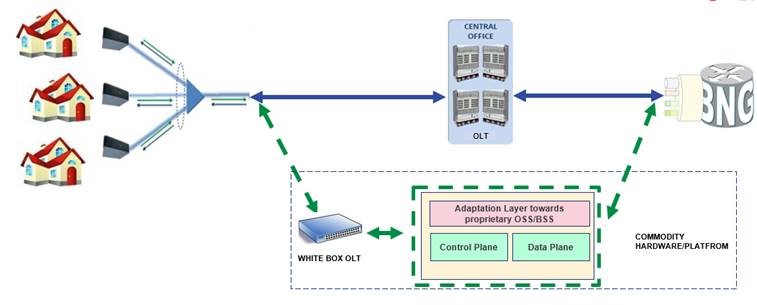SD-PON: Transforming the Fixed Network
Today, forward-looking broadband access solutions must embrace open software-controlled infrastructure
SD-PON: Transforming the Broadband Network Architecture
It’s important to note that deploying SD-PON solutions does not change broadband service providers’ overall deployment model. Changing fiber is the most expensive step a service provider could
take. Instead, the critical transformation comes in changing the OLT from an expensive and proprietary “black box” solution to open and disaggregated “white box” solutions built with bare minimum
silicon, x86 hardware, and general-purpose commodity platforms, as seen in Figure 1 below.
By moving to a white box solution where the software is disaggregated from the hardware, the key benefit that SD-PON brings to the table is reduced OpEx. In the traditional model, CapEx and OpEx costs are passed on as a blended cost from the single-source vendor. With the SD-PON model, CapEx costs are reduced, but the service provider still needs to cover the costs for the silicon, x86 servers and commodity platforms. However, OpEx costs are significantly reduced as it is a software-driven and an open management solution, enabling service providers to easily make changes or enhancements while leveraging a flexible supply chain of vendors.
In Phase 1 of deploying white-box solutions at the OLT, broadband service providers can disaggregate the control and management plane. As the network matures, broadband service providers will be able to move to Phase 2 and disaggregate the data plane as well, but still all on the same general-purpose platform.
The SD-PON solution can also be deployed in the central office or at the network edge, providing broadband service providers with flexibility to deploy the solution where it is needed most to meet their subscribers’ requirements for quality of service, performance and latency.
Insights from Early SD-PON Trial Deployments
Broadband service providers have begun to trial SD-PON-based solutions in their networks, with several service providers in the “walk” phase of a “crawl-walk-run” deployment model, with “run” being a full network deployment. While service providers around the globe are trialing SD-PON, the majority of definitive activity is taking place in Europe and Asia.Deutsche Telekom is one provider that has spoken publicly about its plans to deploy next-generation fixed broadband access using a combination of bare metal hardware, cloud technology, and open source software for its Access 4.0 program. With Access 4.0, Deutsche Telekom plans to deploy geographically distributed edge data centers—that are technically aligned with SD-PON—to deliver broadband services to its subscribers. According to the company, the key benefits of this approach include scalability, efficiency, and reduced time to market.
Similarly, a large tier-one service provider in Asia is trialing SD-PON solutions at the edge in its broadband network to achieve the benefits of SDN, disaggregation, and a multi-vendor ecosystem.
The Future of Broadband Networks
The growing number of residential and enterprise subscribers, the increase in number of devices per user, and the explosion in bandwidth-intensive applications is causing broadband service providers to rethink their access network design for the last mile. Broadband service providers must address these challenges while balancing deployment, upgrade and maintenance costs. Unlike the traditional closed and proprietary systems that dominate broadband networks today, forward-looking broadband access solutions must embrace open software-controlled infrastructure.SD-PON solutions—disaggregated and open—will define the way future broadband networks are deployed. Service providers will be able to reduce overall costs and accelerate new service introduction, all while maintaining the highest quality of experience for their subscribers.




















